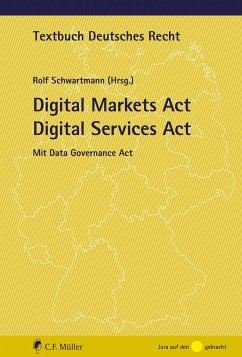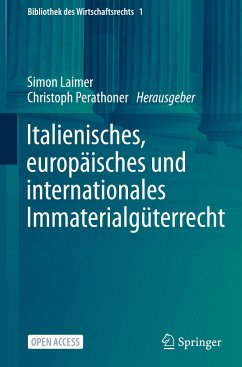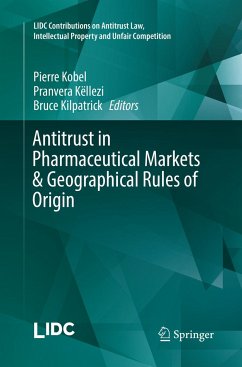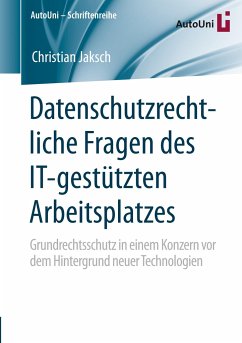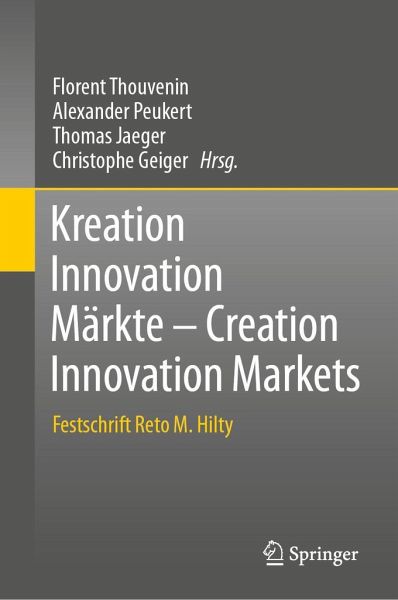
Kreation Innovation Märkte - Creation Innovation Markets
Festschrift Reto M. Hilty
Herausgegeben: Thouvenin, Florent; Peukert, Alexander; Jaeger, Thomas; Geiger, Christophe

PAYBACK Punkte
0 °P sammeln!
Reto M. Hilty hat im europäischen, deutschen und schweizerischen Immaterialgüterrecht tiefe Spuren hinterlassen. Aus Anlass seiner Emeritierung als Direktor des Max-Planck-Instituts für Innovation und Wettbewerb und als Professor ad personam an der Universität Zürich würdigen seine Freunde, Kollegen und Schüler sein Wirken mit dieser Festschrift. Die Bandbreite der Themen und die Vielfalt der Autoren spiegeln die Vielschichtigkeit der Tätigkeiten des Jubilars. Die Festschrift enthält Beiträge zu Grundsatzfragen des IP-Rechts, zum Patent-, Urheber-, Design- und Markenrecht, zum Schutz...
Reto M. Hilty hat im europäischen, deutschen und schweizerischen Immaterialgüterrecht tiefe Spuren hinterlassen. Aus Anlass seiner Emeritierung als Direktor des Max-Planck-Instituts für Innovation und Wettbewerb und als Professor ad personam an der Universität Zürich würdigen seine Freunde, Kollegen und Schüler sein Wirken mit dieser Festschrift. Die Bandbreite der Themen und die Vielfalt der Autoren spiegeln die Vielschichtigkeit der Tätigkeiten des Jubilars. Die Festschrift enthält Beiträge zu Grundsatzfragen des IP-Rechts, zum Patent-, Urheber-, Design- und Markenrecht, zum Schutz von Geschäftsgeheimnissen, zum Recht der geographischen Herkunftsangaben sowie zum Kartell- und Lauterkeitsrecht. Ein Schwerpunkt liegt auf den Herausforderungen der Digitalisierung, insb. auf dem Umgang des IP-Rechts mit Daten und Künstlicher Intelligenz (KI).
Reto M. Hilty has left a deep mark on European, German and Swiss intellectual property law. On the occasion of his retirement as Directorof the Max-Planck-Institute for Innovation and Competition and as Professor ad personam at the University of Zurich, his friends and colleagues pay tribute to his work with this Festschrift. The range of topics and the variety of authors reflect the impressive spectrum of Reto's activities. The Festschrift contains contributions on fundamental questions of IP law, on patent, copyright, design and trademark law, on the protection of trade secrets, on the law of geographical indications as well as on antitrust and unfair competition law. One focus is on the challenges of digitalisation, in particular on how IP law deals with data and artificial intelligence (AI).
Reto M. Hilty has left a deep mark on European, German and Swiss intellectual property law. On the occasion of his retirement as Directorof the Max-Planck-Institute for Innovation and Competition and as Professor ad personam at the University of Zurich, his friends and colleagues pay tribute to his work with this Festschrift. The range of topics and the variety of authors reflect the impressive spectrum of Reto's activities. The Festschrift contains contributions on fundamental questions of IP law, on patent, copyright, design and trademark law, on the protection of trade secrets, on the law of geographical indications as well as on antitrust and unfair competition law. One focus is on the challenges of digitalisation, in particular on how IP law deals with data and artificial intelligence (AI).



